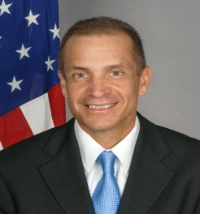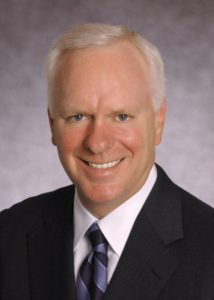BBG Watch Commentary
How clueless and mismanaged can the Broadcasting Board of Governors (BBG) be?

According to an internal email sent by the head of Radio Free Europe / Radio Liberty (RFE/RL) Russian Service, Russian Foreign Ministry officials were invited to the party being planned in a Moscow hotel to mark the 25th anniversary of the opening of Radio Liberty’s Moscow Bureau. U.S. agency executives did it no doubt in part to please Broadcasting Board of Governors Chairman Jeff Shell. He, in a display of extreme poor judgement, wanted to go to Moscow to do private business in Putin’s Russia on behalf of the company he works for, Universal Filmed Entertainment, while also serving as the top presidentially-appointed official of the U.S. agency charged with supporting free media and democracy in Russia and in other countries. It was an unseemly act of mixing private and official U.S. government business, a disturbing sign of continuing mismanagement and apparent conflict of interest within the agency once described by former Secretary of State Hillary Clinton (in 2013) as “practically defunct.”
To no one’s surprise except the BBG executives, Russian government officials detained and expelled Chairman Shell from Russia. Unsurprisingly, Russian Foreign Ministry officials did not show up at the RFE/RL reception in Moscow. Because the BBG bureaucracy bungled Mr. Shell’s travel by not advising him strongly enough not to do private business in Russia and failed to tell him that he must use his U.S. diplomatic passport instead of his regular one, neither the State Department nor the White House came to his defense.
The embarrassment of the head of U.S. news and information agency charged with countering Kremlin propaganda trying to do private business in Putin’s Russia, where these kinds of business activities are controlled by the Kremlin, was too much for the Obama administration. Mr. Shell would do the right thing by submitting a letter of resignation to President Obama. It would be the right thing to do for his private career and for the federal government agency he now leads.

There was visible confusion in Washington and frustration with Mr. Shell and the BBG. Mark C. Toner, Deputy Spokesperson for the U.S. State Department, said on July 13: “First of all, we’re still, frankly, in the process of sorting through all the details of what happened yesterday.” Alluding to BBG Chairman Jeff Shell’s planned private dealings in Russia, Mark Toner could only say: “I’m limited because we’ve not yet received a Privacy Act waiver.”
State Department spokesperson added: “But your question highlights some of the ongoing questions and details that we’re trying to sort through, which is in exactly what capacity he was travelling. And I have to stop there because you said he is – it is a role that he plays. He is also a private citizen.” By their actions, BBG officials made it easy for Russia to stage a provocation to embarrass the United States just a few days before Secretary of State John Kerry’s planned visit to Moscow.
While BBG Chairman Jeff Shell disappointed many with his desire to do business in Russia like Armand Hammer did during the Soviet times (during the Cold War, Hammer would not have been allowed anywhere near Radio Liberty or Voice of America, much less be placed in charge of them), Mr. Shell shares the ultimate responsibility for not avoiding this unseemly conflict of interest and risky behavior with John Lansing, his personal pick for BBG CEO and Director. Mr. Lansing should consider resigning as well as this is not a job for which he is best suited.

John Lansing has no prior government service, public diplomacy, foreign policy or Russia experience and should have never been put in this position by Jeff Shell and the current BBG Board. Mr. Lansing’s chief Russia advisor at the BBG appears to be BBG’s International Broadcasting Bureau (IBB) deputy director Jeff Trimble, who speaks Russian and previously held executive positions at RFE/RL. He accompanied Mr. Lansing on the trip to Moscow, as did new RFE/RL president Thomas Kent. Mr. Trimble should also resign.

Apparently none of them thought there was anything wrong with Mr. Shell going to Russia on his regular passport, mixing his private business with government business. They apparently saw nothing unseemly with inviting Putin’s officials to an RFE/RL reception. If they did, they did nothing to stop it.
They were met with a rude surprise. Of course, they should not have been surprised at all considering recent expulsions of American and Russian diplomats and an incident last month in front of the U.S. embassy in Moscow in which an American diplomat was beaten up by a Russian security guard.
Showing that he indeed has no experience in foreign policy, public diplomacy, and government service–as opposed to experience in U.S. private media where he was quite successful–Mr. Lansing issued a statement apparently written for him by self-serving BBG bureaucrats in which he calls Mr. Shell’s detention and expulsion from Russia “blatant aggression.”
Denying Mr. Shell entry into Russia and detaining him in a locked room for several hours at Moscow’s Sheremetevo Airport despite having a valid passport and Russian visa, before being accompanied by Russian security officials to board a flight to Amsterdam, deserves condemnation from the U.S. government because of the rude treatment he received, but Mr. Lansing’s statement is bombastic as well as misleading and possibly deceptive. Mr. Lansing failed to acknowledge in his statement that Mr. Shell also wanted to do private business in Russia and that Mr. Lansing, Mr. Trimble, and Mr. Kent were in fact allowed to enter Russia at the same time. The Russian Foreign Ministry said that Mr. Shell was put on the Russian no-entry list of Americans in retaliation for the similar U.S. no-entry list for Russian officials accused of corruption. What the Russian officials really wanted was to send a strong signal to Mr. Shell, the BBG, and RFE/RL, and to humiliate him, the agency, and the United States. BBG officials made it easy for the Kremlin to succeed.
Mr. Shell and Mr. Lansing are both good, patriotic and well-meaning men. They are both successful private sector executives and they behave like successful private sector executives. In business, personal and company interests often merge. In the private sector, conflict of interest issues are far less problematic if the company and the shareholders ultimately make a lot money. It is quite different in the government setting, where the rules are different for good reasons of public interest, especially in the sensitive areas of foreign policy and public diplomacy.
Mr. Shell is not the only BBG Board member trying to do business in countries like Russia and China, where human rights violations abound. Some former BBG members did it before him. They even used U.S. government employees to help them. It is a deeply troubling behavior considering the role the agency plays in defending human rights, democracy, and media freedom. These activities cannot be mixed. One cannot serve two masters well at the same time.
This latest diplomatic incident and apparent private conflict of interest behavior on the part of BBG Chairman Jeff Shell illustrates that the U.S. agency in charge of U.S. media outreach abroad has not gotten any better under Mr. Shell and Mr. Lansing. If anything, it has gotten worse. Hillary Clinton, the Chairman of the House Foreign Affairs Committee, Rep. Ed Royce (R-CA), Ranking Democratic member, Rep. Eliot Engel (D-NY) and all other committee members are still right in their previous assessment of the BBG. The agency is defunct, dysfunctional, broken, and mismanaged. It has some good elements left and some excellent journalists and other employees, but it has also become an embarrassment.
Mr. Shell, Mr. Lansing, Mr. Trimble should explain what they did, why they did it and be completely honest about it, or they should resign. Mr. Kent needs to explain what he knew about Mr. Shell’s ill-advised travel to Moscow on private and official business. The U.S. Congress needs to abolish the BBG Board and put in strong anti-conflict of interest clauses into any future reform legislation.
If Mr. Shell, Mr. Lansing, and Mr. Trimble do not resign now or in the next few months, whoever wins the presidential race–whether it is Hillary Clinton, Donald Trump, who has been a target of one-sided attacks in some Voice of America (VOA) programs, or perhaps even somebody else–the next U.S. president must clean house at the agency from top to bottom. The next president working with Congress needs to completely restructure U.S. international media outreach. Only radical reform, which by the way Mr. Shell and Mr. Lansing are on the record as opposing, can make USIM effective again instead of being embarrassingly lame and at times dangerous, as it is now.
